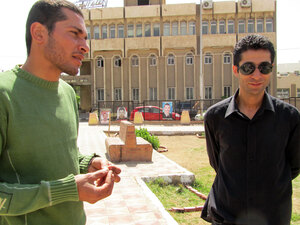Three of them died in a hail of police bullets on the first day, motivating tens of thousands of people to take to the streets of Cairo and other Egyptian cities.
 |
| Hisham Haddad (left) stands with his brother, Hani, at the so-called Hyde Park in Suez, Egypt, while talking about the city's problems since the revolution. |
It's easy to see that no government is in charge in Suez. There are no police officers directing the frenetic traffic on a major thoroughfare. Nor are there any garbage collectors to deal with trash lying about.
Residents interviewed say since the revolution, it has been up to them to handle such tasks. Volunteers sweep the streets and secure their schools, homes and businesses with neighborhood patrols.
They have even taken on the mantle of watchdog over the little government work that is under way. Hisham Haddad, 28, is part of a group called Youth of Suez. On this day, he and others are headed to the waterfront to check on the progress of a beach improvement project.
"We want Suez to become as important as Cairo," he says. "After all, much of our national income comes from the Suez Canal, our oil refineries and industrial zones. So we need to find trusted figures to run this place."
Growing Frustration
Municipal worker Elham Mohamed agrees about the need for trusted figures.
She tells Haddad that's why he ought to skip the beach and take his youth group to the market to be a watchdog over price gouging. She and other residents estimate food and other supplies cost a third or more now than they did before the revolution.
No comments:
Post a Comment